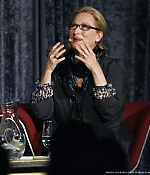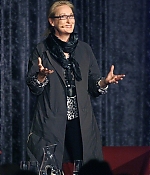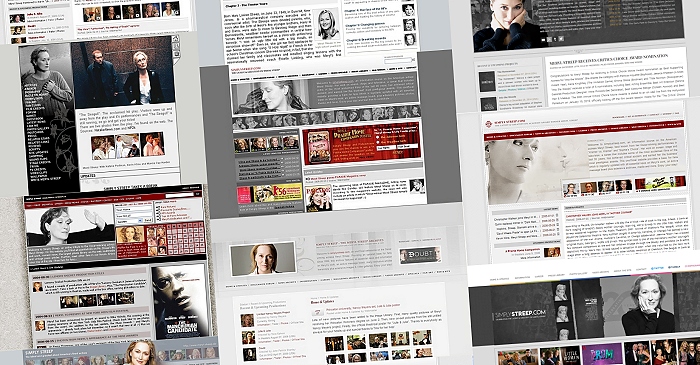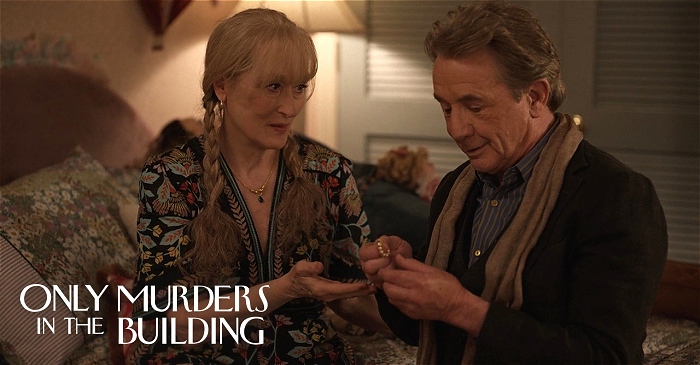
Simply Streep is your premiere source on Meryl Streep's work on film, television and in the theatre - a career that has won her three Academy Awards and
the praise to be one of the world's greatest working actresses. Created in 1999, we have built an extensive collection to discover Miss Streep's work through an
archive of press articles, photos and videos. Enjoy your stay and check back soon. |
The Royal Ontario Museum welcomed Meryl Streep to an evening event celebrating the new touring exhibit, “Vanity Fair Portraits: 1913-2008.” The museum was the only Canadian venue chosen to display the portraits. The exhibit, which marks the 95th anniversary of Vanity Fair, has already toured Europe and Australia and showcases 146 photos. The portraits range from Albert Einstein and Katharine Hepburn to Madonna and Ronald and Nancy Reagan. Johanna Schneller, journalist with The Globe and Mail, engaged in an onstage conversation with Streep, who shared her experiences as a celebrated actress. For a fifty-dollar, ticketed event that was sold out well before the majority of the public knew it was happening, several hundred fans clustered in seats a tad too intimately for an opportunity to hear the Hollywood icon “discuss celebrity life.” Streep’s visit was an advantageous result of the acclaimed opening of the Royal Conservatory of Music’s Koerner Hall – Streep and celebrated Canadian architect Marianne McKenna are old Yale friends and Meryl came to Toronto to see her latest work. Streep told how she slept face down for a year in the hopes that it would turn her nose up a little. How she grew her blonde hair longer to compensate for said nose. And how she eventually realized one day that it all didn’t matter and forged her own path in Hollywood on her own terms. And did so by refusing to live there, by fiercely protecting her personal life and by not being afraid to bare it all onscreen.
One of the most sticking principles she conveyed to the audience was her strong conviction to keep her personal life out of the limelight. Best summed up by Streep herself as, “My performance is for sale, my life is not.” While she loves her work and hopes to stay in the acting business for another decade, she appears grounded despite her success. Throughout the conversation Streep expressed her humility, sense of humour, practicality and gratitude – all traits not often associated with movie stars. The proceeds from the evening will be shared by the Institute of Contemporary Culture and the charities Kageno and SafeHands for Mothers.
On her film debut: “Julia” was my very first movie. I was cast in it after my first play, practically, in New York. It was directed by the great Fred Zinneman and they flew me to London, because at that time they were thinking, maybe they would make Julia an unknown [actress]. So I was actually going to be seen for that part. And while I was there, he cast Vanessa Redgrave. But he said, “you know, yesterday I’ve cast Vanessa Redgrave in the part that I was going to see you for”, and I just went [laughs hyterically]. I thought that was just ridiculous. He said “would you accept a smaller role”, I said “oh my God, I’d do their laundry”. And so it was a great way to learn. Jane [Fonda] told me what a mark was. I didn’t know, for instance, if you go over here because you feel good in the scene, you’re out of the light. So she’d say “that’s your mark. You’re there so that you’re seen” Things like that I didn’t know. I didn’t know anything. (Meryl Streep)
On plastic surgery: Botox limits you. If you do that then you can’t play so many different great parts, and also parts of your face don’t move. For an actor, that’s not the greatest thing. It’s like an interruption in the energy. Early in my career, I remember wondering if I should get my nose done, just a little. Just to turn it up. I remember sleeping on my face in the pillow; maybe I did…for maybe a year. But I think we have a distorted image of ourselves, as women, as girls. It’s still about how we look, after we’ve come through so much. And yet, when I do these films I can’t tell you, that regarding the Julia Child character… I’ve never had people come up and love a character so much, and she was a woman with a big caboose, and she was not beautiful, and it doesn’t matter, because you loved her.
On not speaking about her husband publicly: I don’t really love, sort of, being on magazine covers and having the journalist say “well, now tell us about Don”. Don doesn’t want me to talk about him in a ladies’ magazine. He’s a serious artist who has a life that doesn’t deserve to be reduced to a caption. And the same with my children, I just have never been comfortable using them as little props to make me interesting or darling or whatever I’m supposed to be. So I haven’t really publicised them or have pictures taken with them – of course now they have their picture taken all the time, they love it. But it’s their choice now, they’re in their twenties.














